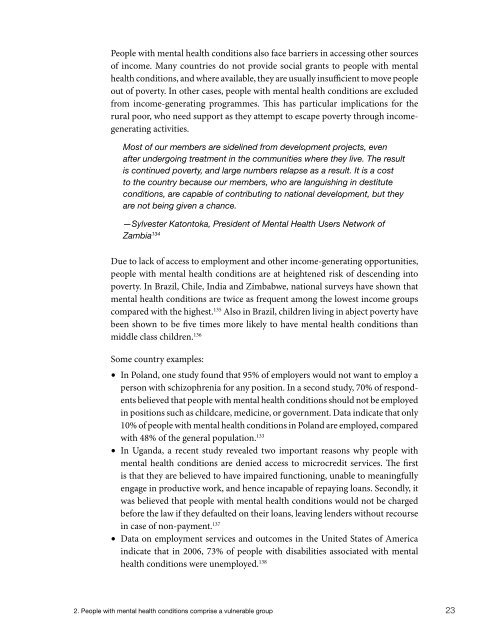MENTAL HEALTH AND DEVELOPMENT: - libdoc.who.int - World ...
MENTAL HEALTH AND DEVELOPMENT: - libdoc.who.int - World ...
MENTAL HEALTH AND DEVELOPMENT: - libdoc.who.int - World ...
You also want an ePaper? Increase the reach of your titles
YUMPU automatically turns print PDFs into web optimized ePapers that Google loves.
People with mental health conditions also face barriers in accessing other sources<br />
of income. Many countries do not provide social grants to people with mental<br />
health conditions, and where available, they are usually insufficient to move people<br />
out of poverty. In other cases, people with mental health conditions are excluded<br />
from income-generating programmes. This has particular implications for the<br />
rural poor, <strong>who</strong> need support as they attempt to escape poverty through incomegenerating<br />
activities.<br />
Most of our members are sidelined from development projects, even<br />
after undergoing treatment in the communities where they live. The result<br />
is continued poverty, and large numbers relapse as a result. It is a cost<br />
to the country because our members, <strong>who</strong> are languishing in destitute<br />
conditions, are capable of contributing to national development, but they<br />
are not being given a chance.<br />
—Sylvester Katontoka, President of Mental Health Users Network of<br />
Zambia 134<br />
Due to lack of access to employment and other income-generating opportunities,<br />
people with mental health conditions are at heightened risk of descending <strong>int</strong>o<br />
poverty. In Brazil, Chile, India and Zimbabwe, national surveys have shown that<br />
mental health conditions are twice as frequent among the lowest income groups<br />
compared with the highest. 135 Also in Brazil, children living in abject poverty have<br />
been shown to be five times more likely to have mental health conditions than<br />
middle class children. 136<br />
Some country examples:<br />
• In Poland, one study found that 95% of employers would not want to employ a<br />
person with schizophrenia for any position. In a second study, 70% of respondents<br />
believed that people with mental health conditions should not be employed<br />
in positions such as childcare, medicine, or government. Data indicate that only<br />
10% of people with mental health conditions in Poland are employed, compared<br />
with 48% of the general population. 133<br />
• In Uganda, a recent study revealed two important reasons why people with<br />
mental health conditions are denied access to microcredit services. The first<br />
is that they are believed to have impaired functioning, unable to meaningfully<br />
engage in productive work, and hence incapable of repaying loans. Secondly, it<br />
was believed that people with mental health conditions would not be charged<br />
before the law if they defaulted on their loans, leaving lenders without recourse<br />
in case of non-payment. 137<br />
• Data on employment services and outcomes in the United States of America<br />
indicate that in 2006, 73% of people with disabilities associated with mental<br />
health conditions were unemployed. 138<br />
2.Peoplewithmentalhealthconditionscompriseavulnerablegroup<br />
23

















